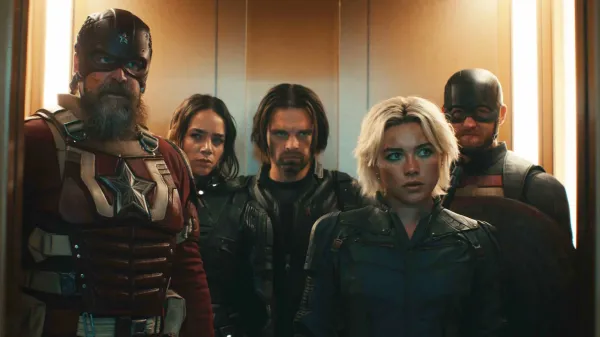
Not since the original Guardians of the Galaxy movie has Marvel so successfully forged a team that worked so convincingly together and resulted in so much emotion by the end of their maiden journey than we get in Thunderbolts* (the meaning of the asterisk in the title is revealed by the end of the film).
The primary difference here is that we know these characters already—some more than others—and we get to know them a great deal more throughout this film. In very real ways, the members of this team are assembled because they are broken to some degree, and as a result, they’ve been okay walking the line between hero and villain—classic antihero case studies, all of them.
Some, like Bucky Barnes (the most famous of the bunch, played by Sebastian Stan), didn’t have a choice in his time as the mind-controlled Winter Soldier. But as hinted at in Captain America: Brave New World, he ran for, and apparently won, a seat in Congress. Although the film is a true ensemble effort, Thunderbolts* thankfully seems to zero in on the struggles of Yelena Belova (Florence Pugh), adopted sister to the late Black Widow and daughter to fellow teammate Alexei Shostakov/Red Guardian (David Harbour), who has temporarily hung up his ill-fitting superhero costume to run a limo-driving company.
Yelena sees herself as the bad guy, not worthy of the title of hero, even though she longs to follow in the path of her sister. But the writing in her ledger is soaked in blood, and she may be too far down her path to turn things around. In addition to Yelena and Red Guardian, another refugee from the Black Widow movie is Taskmaster (Olga Kurylenko), one of the most interesting villains Marvel has ever created—so naturally she’s taken out of the film as quickly as she’s brought in. She might be the most damaged goods of the entire team, so of course, the filmmakers figure we can’t handle something that heavy.
The members of the eventual Thunderbolts are all brought together by their mutual handler, Valentina Allegra de Fontaine (Julia Louis-Dreyfus), who has popped up here and there in various movies and series, most recently during Black Panther: Wakanda Forever. She’s a nasty piece of work, and most of the assignments she hands out involve assassinations and/or stealing government secrets from other countries. The first time we met her was at the tail end of the Disney+ series The Falcon and the Winter Soldier, where we also met John Walker (Wyatt Russell), who was given the position of Captain America after Sam Wilson gave up the shield bequeathed to him by Steve Rogers. Walker didn’t last long in the role because of his violent nature, but Valentina saw potential in him as U.S. Agent, a lawless version of Captain America, complete with banged-up (non-vibranium) shield and a super-soldier serum running through his veins.
Rounding out the team is Ava Starr/Ghost (Hannah John-Kamen), a phasing fighter whose only appearance was in Ant-Man and the Wasp (yes, that was seven years ago). Her body was practically torn apart every time she used her power, but she seems to have gotten her act together somehow, and as this character summary might imply, she’s sadly the most underwritten character of the bunch. Val calls them all together for the express purpose of having them kill each other, but as soon as they figure this out during on all-out brawl, they work together to escape certain death while Val attempts to literally incinerate all traces of a secret project known as Sentry.
During what is essentially the team’s formation, they meet an unknown guy in a hospital gown named Bob (Lewis Pullman), who seems like a stray civilian who got caught up in some low-grade medical experiment, but it turns out he is far more than that, being given powers by Val’s team of scientists that make him stronger than any of the others (as Yelena observes “We all just punch and shoot”); none of them even fly, but Bob does, and at least for a time, he’s under Val’s control. Bucky convinces everyone else that this is their time to be the heroes they thought they never could be, and taking their name from Yelena’s pee-wee soccer team, the Thunderbolts* are born.
Bob is easily the most mentally unstable of anyone in the film, and while he seems like a decent guy in the beginning, his insecurity brought on by years of childhood abuse at the hands of his father (which is kept thankfully vague) lead him to believe that his new friends will either abandon or turn on him eventually, leaving him feeling isolated and wondering why he needs to take orders from Val. But Yelena recognizes a fellow depressive traveler when she sees one, and a bond she forms with Bob early on ends up being important in this story, helmed by Robot & Frank director Jake Schreier, who treats mental illness and the resulting dysfunction as seriously as any Marvel movie ever has, which is to say, it skims the surface of the topic without getting too deep.
The result is an emotionally driven adventure, a team bonded by similar trauma, a solid redemption arc, and a group of people I genuinely enjoyed spending time with and would like to spend more time with (all of the cast is reported to be in the next Avengers film, so that helps). While the action sequences are outstanding, it’s Pugh’s thoughtful performance (and to a lesser degree, Stan’s) that propels Thunderbolts* through its rough patches, making it one of the better Marvel movies in recent memory.
The film is now playing in theaters.
If you enjoyed this post, please consider supporting Third Coast Review’s arts and culture coverage by making a donation. Choose the amount that works best for you, and know it goes directly to support our writers and contributors.
